

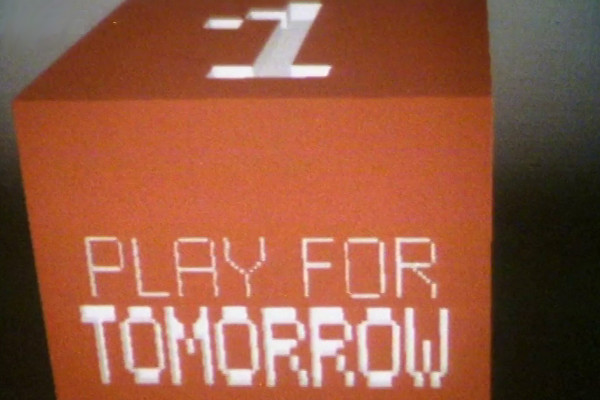
The series featured well known acting names, including Bill Nighy, Kenneth Branagh, Neil Pearson, Colm Meaney, T.P. McKenna, Derrick O'Connor, Robin Ellis, Stephen Greif, Malcolm Terris, Gerard Kelly, Russell Hunter, Francesca Gonshaw, Jeremy Child and Denys Hawthorne. Was it worth a watch, a terrifying vision of the future? Or was it just a bit flat and best forgotten? Please join me as we find out, ranking the six episodes from worst to best...
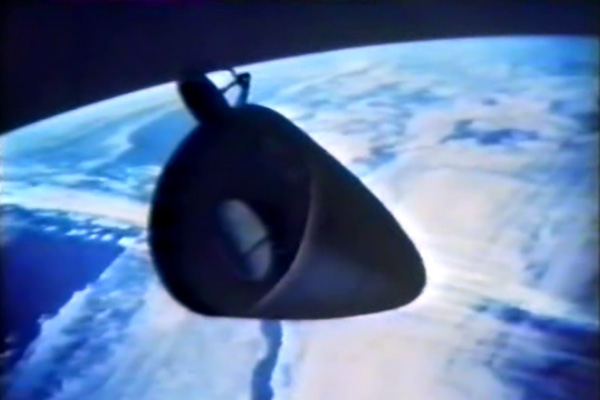
Play For Tomorrow was an offshoot of the far more regarded Play For Today, which had run on the BBC since 1970. The parent series was on the way out itself, as it only had two more series left in it before the axe fell in 1984. But while Play For Today is still discussed, repeated and parodied, Play For Tomorrow was shown once and then seemingly forgotten.
As there's so little information out there relating to the programme, it's perhaps worth looking at newspaper archives in order to see what was said at the time. For this article, I'll try to get a bit more contemporary insight from back issues of The Times, which intially gave it coverage. 1982 was an age where science fiction wasn't taken as seriously as today, and a write-up of the concept on 8th April, 1982 had a dismissive air before the show had even been on the TV: "[...] so seriously did the BBC take its intentions to make the whole series suitably intelligent that they even held a seminar on the future to provide background information. Nine specialists were invited to give their views, including the campaign organizer (sic) of Friends of the Earth, the director of the Solar Trade Association and a computer scientist.
The seminar was duly recorded and sent to the chosen writers of the six plays, "for them to extract what information they required," according to Neil Zeiger, the series producer. "Beyond this, the only brief given to them was that of the time scale and the fact that they should be 60-minute studio plays, aimed at contemporary audiences".
All this earnestness contrives to give the project the atmosphere of the senior common room, rather than that of the theatre. For despite Zeiger's hope that, "when viewers look at the six plays, they will be prompted to think about the long-term consequences of present-day decisions," it seems more likely they will be left considering whether anyone can truly create exciting television drama by seminar."
The six plays were set between 1997-2016, with the most common year chosen, as here, being 1999. While it's incredibly easy to laugh at quaint visions of the future when said future is now our past, the effort to try is at least to be applauded, whether it's successful or not. More importantly, if we're going to snigger at the concept of someone in 1982 creating a piece of work that talks of fear of nuclear war in 1999, then by definition this means we also have to snigger at Prince, so that's kind of off the table.
None of the Play For Tomorrow episodes are exactly bad... but then not many of them are exactly good, either, which is the main problem. Play For Today itself could be hit and miss, especially around this late stage, but the problem is that all of Play For Tomorrow feels not quite fully formed. Many of them are an idea, or a talking point, played out on screen without any real narrative drive. Others that do have a story don't quite have the futuristic concepts behind them, almost as if they were rejected Play For Today scripts that the writers had hastily scribbled "set in the future" on.
As an episode then Nuclear Family certain has its strengths, and there's a very real argument that it should be ranked much higher than it is here. Yet tonally it's all over the place - starting out as a serious play, then going into some comic schtick as a dysfunctional family undertake a "holiday" - cleaning small nuclear bombs for a living. It can't really seem to decide if it's a serious prophecy or just a parody, and in so doing becomes neither. For trivia, then this episode was scheduled ten minutes later than the others, planned for broadcast at 9:35pm.
Peter Ackroyd reviewed the episode in The Times, stating that it was the best to that point, a farce which sends up viewers' expectations of the future. Yet he also noted that "[...] the problem of Play for Tomorrow remains: we are a generation obsessed with the future and yet unable to see it clearly; it is assumed that human life will change in some marked fashion, but no one has suggested how that will occur. If we were able to confront these questions with confidence and insight, we would appreciate our own situation so much the better. Although the future will be different from anything we imagine, the writer's task is to render it as imaginatively as possible."
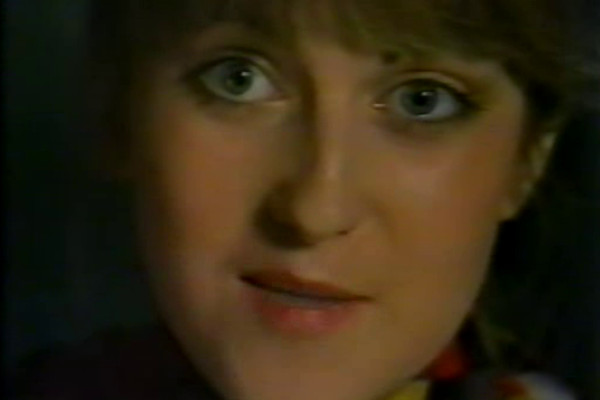
Crimes is set in a future society where criminals are controlled by the state. Although it's fairly world-building, it tends to be a series of monologues rather than a dramatic narrative. Writer Caryl Churchill had been behind two 1978 Play For Today episodes, "The After Dinner Joke" and "The Legion Hall Bombing", the latter of which saw her remove her name in protest due to editorial interference.
There is a certain prescience to this one as the government prepares to place the UK under "shutdown" and consign everyone to nuclear fall out shelters. Oddly, this plot element is only really made explicit in the last ten minutes or so, and doesn't really mesh with the main plot about prisoners telling their life stories to camera.
Lucy Hughes-Hallett gave an unimpressed review in The Times, among her comments being: "Who is the more reprehensible, the man who mounts a machine-gun outside his nuclear fall-out shelter to repel those with no refuge of their own, or his friend who asks to be taken in, knowing that, if he is admitted, the family's chances of survival will be drastically reduced? Caryl Churchill's Play for Tomorrow, Crimes (BBC1), was an anthology of human wrongdoing, connected by an alienatingly perfunctory narrative. A videotape of an interview is shown to a group of prisoners; their reactions and a subsequent discussion are recorded on a further tape which the prison administrator watches at home in his shelter. The crimes are not so much compared as juxtaposed. The play's separate elements merge only in the mind of the viewer, who is left to place the characters in some hierarchy of relative guilt. Such ordering is futile."
It's a fair point and one that's generally hard to disagree with. Although there are nice elements, this is the episode that's least constructed into a working plot. Lastly, the Radio Times listed this one as being set in 2002, but this isn't the case: a character who was born in 1982 says it was "18 years ago", so the latest the play can be set is 2001.
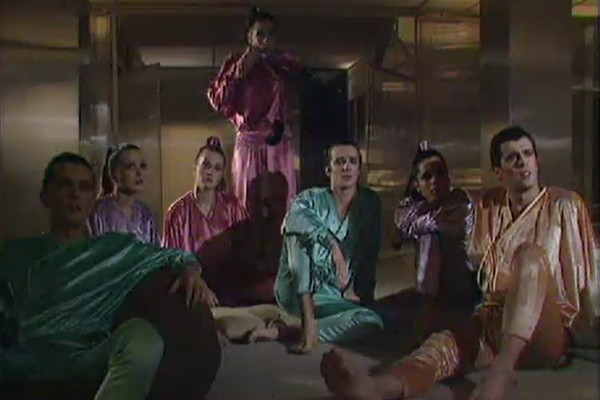
Shades starts off better than most, with some futuristic guesses that are surprisingly accurate, including viewing the world through electronic glasses, a widespread virus and errr... the SDP being the government. But the whole thing begins to get bogged down when the central characters develop an interest in that most clichéd of SF tropes - the "historical" year that happens to be the year it was made.
Strictly speaking, most of this one was made in 1982, with studio production dates from 18th-20th January. However, the 1981 of which the "futuristic" characters are so intrigued was the year when the outside filming took place, with a recording date of 18th December. Things get dragged down further by shouty and weak performances: while some of the cast have gone on to long lasting careers (such as Neil Pearson, Tracey Childs and Shelagh McLeod), others were far less successful, and it shows why here.
If we're to take the basic tenet of television that "sex sells", then having pretty young people walking around in very little clothes talking frequently about sex is a ratings grabber on a primal level. But once the futuristic environment and the pretty faces have faded away, there's very little left, with a point-making script that does often seem like a student revue. There's nothing inherently wrong with politics in plays, of course, quite the opposite - it's just that, at its worst, Play For Tomorrow can seem like "The Teenagers", the trite school play written by Rick from The Young Ones in the spin-off book, "Bachelor Boys".
By this stage in the series The Times had stopped reviewing the show, which is perhaps the most damning thing of all - not being eviscerated by a broadsheet, but being thoroughly ignored by it. It did, however, get reviewed on BBC2's Did You See..? four days later. Novelist Ian McEwan cut Shades some slack, while acknowledging that it was too ambitious and tried to do too much, but critic Julian Symons was far less forgiving. Political writer and lecturer Dr. Janet Morgan tried to see both sides, though was generally negative and cited the "lousy dialogue". Presenter Ludovic Kennedy didn't fix himself down to a fully stated opinion, but made it quite clear that he didn't get much out of it.
Play For Tomorrow has never been released on VHS or DVD, a fact which should be incredibly obvious by the low-res quality of the screenshots in this article, which were taken from off-air VHS copies, degraded over the four decades since they were taped off the telly. However, this one's inclusion in an available episode of Did You See..? meant that images which were a bit better have been able to be used.

Cricket is a tonally odd instalment, essentially a one-room play with five men debating cricketing tactics. The "future SF" element comes with the fact that it was set in the then-futuristic 1997, and that they use computerised predictive technology to work out their best possible chance of success. A strong cast including Jeremy Child and Simon Rouse helps elevate what could be a fairly flat attempt at satirical comment into something quite engaging. The episode begins and ends with the BBC's familiar cricket theme ("Soul Limbo") which adds to the offbeat parody, even if it's not entirely clear what is being parodied, or why.
As with most of the series, then the glimpses of the "future" are quaint, almost charming, and the "technology" amusing. The group are paranoid that they're being monitored, and do everything to avoid detection, and there's a subplot about forestry guerrilla warfare that is possibly underdeveloped, or is buried in the narrative with a subtlety most of today's television wouldn't approach: we never find out for certain who is spying on them, or whether the captain's wife is plotting against them. Although it's heavily implied, it's never spelt out for certain, a rare example of ambiguity in a series which generally does everything in its power to avoid it.
Lucy Hughes-Hallett again gave a dismissive review in The Times, her opinions including: "A group of stock characters from a variety of not totally compatible literary-bucolic conventions (a goofy lord, an affable, red-faced farmer, a bolshie schoolmaster and a female escapee from Cold Comfort Farm) meet to discuss the team for next week's cricket match. [...] If this is the future give me the present; it is more amusing and a great deal more modern."
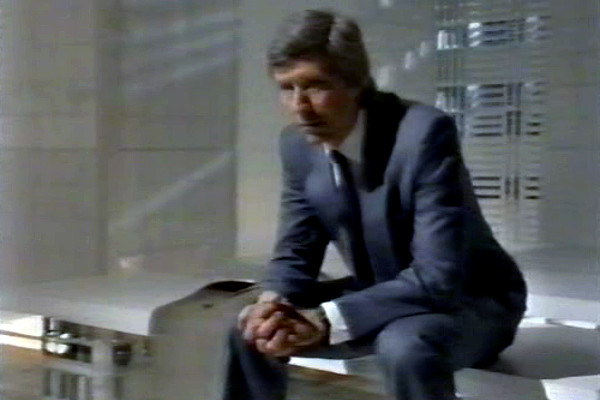
Play For Tomorrow aired in the same timeslot as Play For Today - indeed, it even began airing the week after the twelfth series ended. In fact, it's not altogether clear why these six plays couldn't have been part of Play For Today, as the show had regular SF and fantasy editions, and this was less than 18 months after one of its most celebrated instalments, The Flipside of Dominick Hide.
This one is a strong entry, with Robin Ellis (Poldark) reflecting on his relationship with his daughter over three decades' worth of New Year's Eve celebrations. This time he visits her in a futuristic prison in a 1999 where Europe has a single army and wages war upon the rest of the world. However, as with all such matters, appreciation of television is pretty subjective.
In The Times, Anthony Masters slated the production, claiming it to be: "[...] as wretched a piece of television hackwork as I have ever seen [...] a 55 minute play needs more than one idea. [...] if this series's view of tomorrow is right, the graffito may well be prophetic that says it has been cancelled for lack of interest."
Certainly Masters wasn't far off in his own prediction of the future... Play For Tomorrow was never brought back to television.
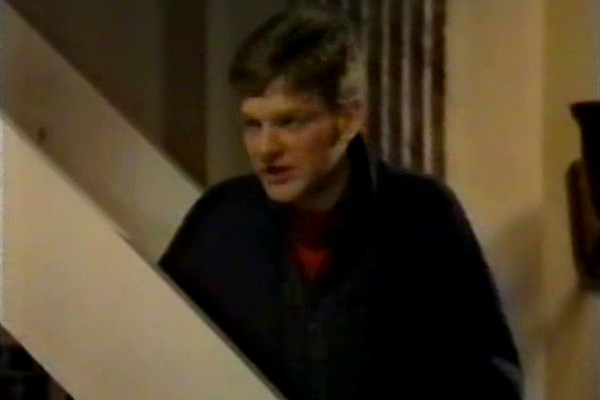
The most successful of the Play For Tomorrow series, with writer J. Graham Reid projecting concerns about Northern Ireland 34 years into the future. Smoking indoors is depicted, and the only real sop to the futuristic setting is communication monitors, where people talk to one another via screens - a sobering reminder that this was still science fiction back in 1982, not the everyday reality for many today. Despite this, it engages, with some surprising plot twists.
As mentioned in the introduction, Play For Tomorrow has some fairly big names in it, even if they weren't at the time: Kenneth Branagh has a small part here as a rebellious student, in one of his earliest parts on television. Writer J. Graham Reid had written Branagh's first TV role in a Play For Today episode, "Too Late to Talk to Billy", when Branagh was a developing stage actor struggling to get an Equity card.
Branagh talks about Play For Today, and the half-conscious loss of his original Belfast accent in his 1989 autobiography Beginning. Sadly, there's no direct discussion on Play For Tomorrow. It, like the rest of the series, seems destined to be largely forgotten.